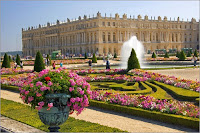.
This past Wednesday, the first reading at mass was Genesis 2:4B-9, 15-17, in which God creates a garden and places man in it. Here are some of the verses:
and he placed there the man whom he had formed.
Out of the ground the LORD God made various trees grow
that were delightful to look at and good for food,
with the tree of life in the middle of the garden
and the tree of the knowledge of good and evil.
The LORD God then took the man
and settled him in the garden of Eden,
to cultivate and care for it.
I was reflecting on this familiar passage when I came across this footnote in the Catholic New American Bible (Rev. Ed.): “It should be noted, however, that the garden was not intended as a paradise for the human race, but as a pleasure park for God; the man tended it for God. The story is not about “paradise lost.”
The footnote continued: “The Garden in the precincts of Solomon’s temple in Jerusalem seems to symbolize the garden of God, (like gardens in other temples).” We can find allusions to this garden in the Psalms, e.g. “He is like a tree planted by flowing waters” (Ps. 1:3), “planted in the house of the Lord, they shall flourish in the courts of our God” (Ps. 92:14), and also in the final chapter of the Book of Revelation, Ch 22 verses 2 and following).
I immediately thought of all those beautiful “pleasure gardens” I’ve seen attached to all of the palaces and chateaux in Europe. I pictured the beautiful symmetrical layout of the gardens of Versailles, for example, where everything is harmonious: the paths and the flower beds, the fountains and statues, the trees and shrubs. There’s something about that orderliness that delights us -- that’s why God did not put our first parents into a trackless forest or a jungle, but into a garden.
 With the Fall, we were expelled from the Garden, but to this day we feel nostalgia for that original order that delighted both God and us. We still want the world to make sense, we want to see the gist of things. And every now and then we are surprised and delighted when we come across a little splinter of that original Garden in which everything was ordered and harmonious. Watch the face of a child when she puts in the last piece of a jigsaw puzzle and sees the whole picture. Think of the feeling of satisfaction we feel at solving a problem or watching the detective put the clues together and solve the crime. Something inside of us shouts, “Yes!” We are made for order, for seeing the patterns of things.
With the Fall, we were expelled from the Garden, but to this day we feel nostalgia for that original order that delighted both God and us. We still want the world to make sense, we want to see the gist of things. And every now and then we are surprised and delighted when we come across a little splinter of that original Garden in which everything was ordered and harmonious. Watch the face of a child when she puts in the last piece of a jigsaw puzzle and sees the whole picture. Think of the feeling of satisfaction we feel at solving a problem or watching the detective put the clues together and solve the crime. Something inside of us shouts, “Yes!” We are made for order, for seeing the patterns of things.
Perhaps this is why times of rapid change are so uncomfortable for us, because the “gist” of things is temporarily beyond our grasp, and the world is not a comfortable place. At times like this, Christians have to rely on their Faith, confident that God is still ultimately in charge.
But Christians cannot simply retreat into caves and wait for order to be restored: we need to be working to restore that order.
Even if we don’t feel ourselves called to some public action to help restore the Reign of Love in the world, we are all called through our Baptism to spread as much peace, justice and love as we can in our own hearts, our lives, our families and our workplaces by living the values of the Kingdom every day.

We have to believe that our quiet, good example can be like the tiny mustard seed or the single grain of wheat that Jesus talks about in the parables of the Kingdom. We have to at least plant the seeds.




You & the other monks quiet example means more than you know. It's much more than a mustard seed.
ReplyDelete